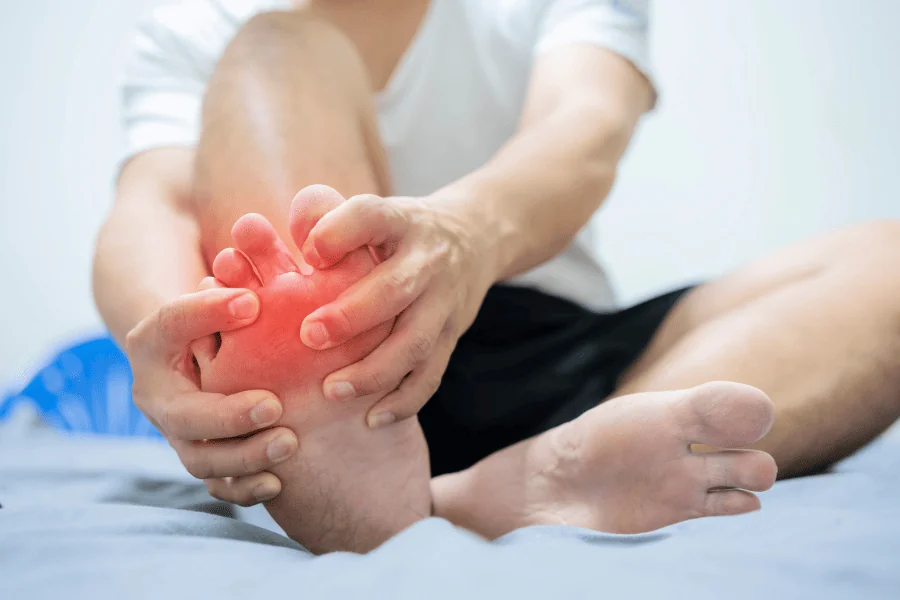Gout is a common form of arthritis that can affect anyone. It most commonly presents as swelling, aching, redness, tenderness, and sudden pain in one or more joints. Usually, the joint at the big toe is where the symptoms begin. Gout symptoms can come and go, but what causes gout and how can you manage it? Discover more with CheckPoint Urgent Care.
Managing Gout With CheckPoint Urgent Care
Gout attacks can occur suddenly, most often waking patients in the middle of the night with a burning sensation in the big toe. The joint may be so tender that even the weight of a light bedsheet may irritate the area. With certain medications and at-home remedies, gout can be manageable.
Causes of Gout
Gout occurs when urate crystals accumulate in your joint, causing inflammation and intense pain. These crystals form when the uric acid level in the bloodstream gets too high. Uric acid is produced naturally by the body to break down purines. Purines are found in foods- such as red meats, organ meats, sardines, anchovies, mussels, scallops, trout, and tuna. Alcoholic beverages, especially beer and sugary drinks sweetened with fructose can cause high levels of uric acid in the body.
Normally, your body dissolves the uric acid, passing it through your kidneys and into urine. When your body produces too much uric acid or your kidneys excrete too little uric acid, this can cause a buildup and lead to the formation of crystals. These crystals are what cause the pain, tenderness, and swelling seen with gout.
Symptoms of Gout
The symptoms of gout most often appear suddenly and at night. Symptoms can include:
- Intense joint pain: this is usually in the big toe, but can be found in other joints like the knees, ankles, wrists, elbows, and fingers. The pain is likely to be more intense within the first 12 hours after it begins
- Lingering discomfort: after the initial pain subsides, there might be a lingering pain that can last for a few days to a few weeks. Later attacks are likely to affect more joints and last longer
- Inflammation and redness: the affected joints become tender, swollen, inflamed and red
- Limited range of motion: as gout progresses, you may experience not being able to move as freely as you did previously
Treatment of Gout
Currently, gout is treated with two different types of medications that focus on two different problems. The first medication helps reduce the swelling, inflammation, and pain associated with gout attacks. The second is to control the amount of uric acid in your body. Your doctor can determine which course is best for you by looking at the severity of your symptoms coupled with your medical history.
Drugs used to treat gout include:
- Nonsteroidal anti-inflammatory drugs (NSAIDs): these can include common over-the-counter pain relievers like Tylenol and Advil. There are also prescription-strength NSAIDs your doctor may prescribe
- Colchicine: this is an anti-inflammatory drug that reduces gout pain
- Corticosteroids: these can either be pills or injections straight into your joint. These medications can control inflammation and pain
- Medications that block uric acid production: these drugs may be recommended if gout attacks are frequent or extremely painful. Drugs such as allopurinol (Aloprim, Lopurin, Zyloprim) and febuxostat (Uloric) help limit the amount of uric acid your body makes.
- Medications that improve uric acid removal: your doctor may prescribe medications that help improve kidney function to remove uric acid from your body
These medications, when coupled with a few lifestyle changes are effective ways to treat gout and prevent future flare-ups:
- Choosing healthier beverages: drink plenty of water and limit your intake of alcohol and drinks sweetened with fructose (fruit sugar)
- Avoid foods high in purines: low-fat dairy products may be a better source of protein for those who are prone to gout. Try to avoid red meats, organ meats, tuna, scallops, sardines, mussels, trout and anchovies
- Exercise regularly and lose weight: low-impact activities such as walking, biking, and swimming are usually easier on joints
Risk Factors for Developing Gout
You’re more likely to develop gout if you have high levels of uric acid in your body. Risk factors for increasing uric acid include:
- A diet rich in purines: Try to avoid red meats, organ meats, tuna, scallops, sardines, mussels, trout, and anchovies. Also, limit your alcohol consumption and limit drinks with fruit sugars
- Being overweight: if you’re overweight, your body produces more uric acid and the kidneys will have a harder time expelling the uric acid
- Medical conditions: certain diseases can increase your risk of developing gout such as heart disease, kidney disease, diabetes, and untreated high blood pressure
- Certain medications: certain medications can increase uric acid levels, such as low-dose aspirin and anti-rejection drugs for those undergoing organ transplants
- Family history
- Age and sex: gout primarily affects men ages 30- 50. This is because they generally have higher uric acid levels than women. Women tend to develop gout after menopause
- Recent surgery or trauma: sometimes these events can trigger a gout attack
Relief from Gout at CheckPoint Urgent Care
If you think you may have gout, the doctors at CheckPoint Urgent Care have the knowledge and expertise to get you back to feeling better quickly. By combining certain medications and a few lifestyle changes, gout can be manageable. Visit our website to find a location near you today.








